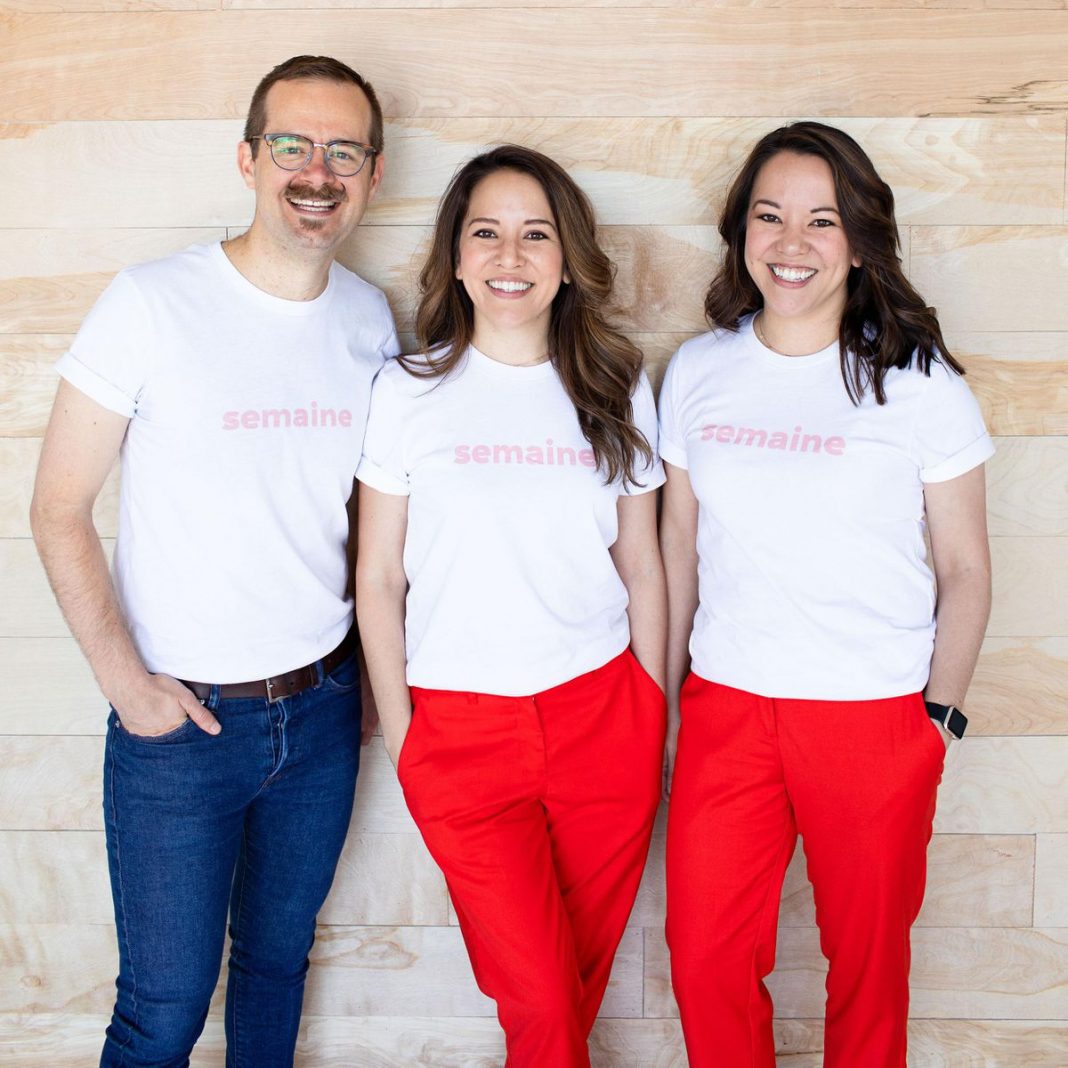Twin sisters Lauren Lee-Crane and Catherine Lee wanted to tap into their passion and personal experience to help women experience less painful periods. As endometriosis warriors, they are familiar with the challenges women face in finding solutions for their chronic period pain. They teamed up with Lauren’s husband Matt, who brought his background in bioengineering to develop a plant-based product to improve period pain. Here, they talk about the creation of their company, Semaine Health, which offers supplements, education, and opportunities to engage and discuss menstrual health.
The team behind Semaine: Matt Lee-Crane, Lauren Lee-Crane, and Catherine Lee
Semaine
Jess Cording: What was the inspiration behind the company?
Lauren Lee-Crane: I have always had painful periods and was diagnosed with endometriosis at 30. Matt has been on the hardest part of my health journey: taking care of me through multiple surgeries and seeing me in excruciating pain. I could no longer take traditional OTC painkillers because my stomach lining is shot after decades of use for my period pain. Matt started adding plant-based ingredients to my morning smoothies. He chose the ingredients like curcumin and green tea and resveratrol based on clinical studies done with these ingredients on patients with dysmenorrhea (the clinical term for painful periods). After a few weeks of testing, I had a pain-free period, which had never happened in my life!
Cording: What was the process like of taking your idea and making it into an actual product?
Lauren: It wasn’t until we sent some to Cath, and she experienced a pain free period, that we even considered turning the concept into a product for others. Our next step was to encapsulate the powders so they were easier to use and to find a manufacturer with an FDA-approved facility that could produce the capsules at scale. We bootstrapped the first 18 months with just a small crowd-funding campaign. That enabled us to launch Semaine on our own website in March 2020.
Matt Lee-Crane: We took a systems approach to the research to understand how all the different parts of the menstrual cycle fit together and interact, rather than just trying to think about one symptom—like pain—in isolation. I didn’t want to create just a ‘band-aid’ that masked one or two symptoms. My goal with my research was also to make sure that all the supplements had been well studied, that we understood how they worked and knew how to make sure they’re well absorbed. We ran a small trial before launching the supplement publicly to provide data for our patent application, and we’re ready to take the next step in our research by running a much larger and more focused clinical trial. Running clinical trials is really hard and expensive, but we’re committed to continuing to marry wellness approaches with rigorous science. Once we have the results of that trial, we’ll be submitting it for peer review in an open access journal. We want all our customers to be able to dive into the details so they feel empowered in their knowledge that they are taking something that has been rigorously tested and understand why and how it works.
Semaine Co-Founder Lauren Lee-Crane
Semaine
Cording:Your website provides educational articles on the blog about the links between diet and inflammation and how that relates to period pain. Women—especially women of color—are often dismissed by the medical community. What are some ways that we can normalize these conversations and help women get proper care?
Lauren: Our mission with Semaine is to not just provide solutions to women’s health that has been overlooked, but to make sure we’re shifting the paradigm in how we talk about these natural parts of our lives. As a society, the only time we tend to truly see and think about women’s bodies from a health perspective is through the lens of fertility/pregnancy. And even then, we know the care around maternal health is not what it should be, especially for women of color. Our periods and entire monthly cycles tell us so much more about our health and wellbeing than just whether we’re fertile. The more we understand women’s bodies, the more we can thrive and feel empowered about the choices we make at every stage of our lives. It’s important to normalize conversations around periods and period symptoms so that we know we aren’t alone and so we can demand better treatment and representation in the medical and pharmaceutical fields.
Catherine Lee: We hope we can help make the feminine care aisle an accessible, fun place to shop. Shopping for period products should feel like a treat. Women should have as many period product options as they do make-up options. Every body is different and needs different types of support.
Semaine Co-Founder Catherine Lee
Semaine
Cording: What is something you wish everyone knew about period pain?
Lauren: Period pain is not normal. Period pain is common. We are told so often that period pain is just part of being a women and we have to just grin and bear it. Some cramping is totally normal (your body is physically working to shed your uterine lining), but any amount of pain should always be investigated by a healthcare professional because it’s your body sending you a signal. That signal might just be your prostaglandin levels are a little higher because you’re in your teens and your hormonal fluctuations are more intense, or they are signaling something to investigate further like fibroids, endometriosis, cysts, etc. No one should ever be told “it’s in their head” or normalize any amount of pain someone is experiencing.




